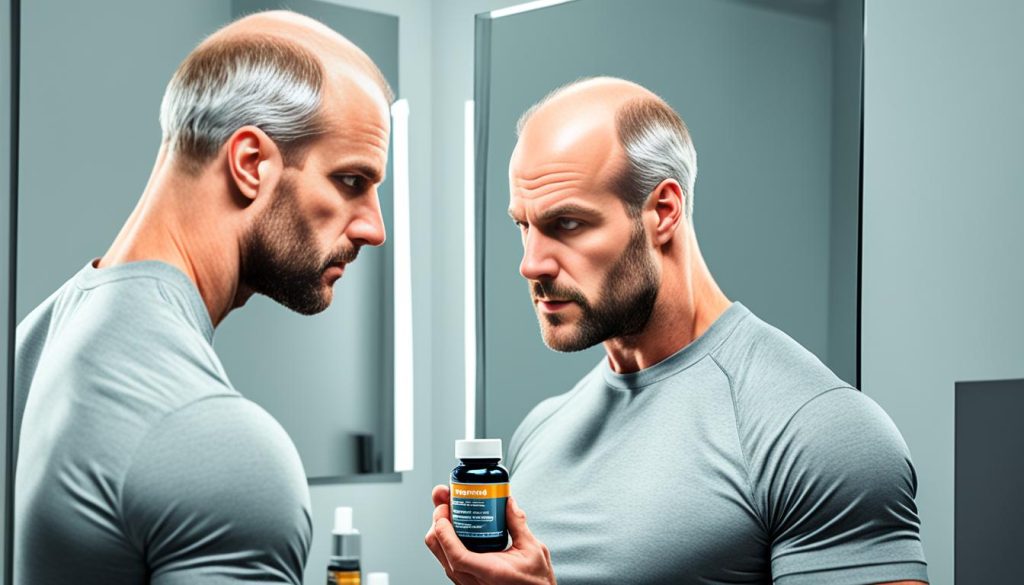Ad Blocker Detected
Our website is made possible by displaying online advertisements to our visitors. Please consider supporting us by disabling your ad blocker.
When it comes to baldness, many people believe that high testosterone levels are the culprits. However, the relationship between testosterone and hair loss is more complex than it seems. In this article, we will explore the connection between low testosterone and hair loss, and understand how genetics, hormones, and other factors contribute to male pattern baldness and hormonal hair loss in men.
Key Takeaways:
- Low testosterone levels do not directly cause hair loss.
- The hormone DHT, derived from testosterone, plays a significant role in hair loss by binding to the hair follicles.
- The sensitivity of hair follicles, determined by genetics, ultimately determines the chances of experiencing hair loss.
- Other factors such as age, stress, and genes also contribute to hair loss.
- Consulting with a board-certified dermatologist can help individuals develop personalized treatment plans for addressing hair loss.
Understanding Testosterone and Hair Loss
When it comes to hair loss, understanding the relationship between testosterone and hair follicles is crucial. Contrary to popular belief, testosterone itself is not the direct cause of hair loss. Instead, it is the hormone dihydrotestosterone (DHT), which is derived from testosterone, that plays a significant role in hair loss.
DHT interacts with the hair follicles, causing them to shrink and produce finer and weaker hair. This process, known as miniaturization, gradually leads to the cessation of hair growth. However, the sensitivity of the hair follicles to DHT is determined by genetic factors, meaning that some individuals are more prone to hair loss than others, regardless of their testosterone levels.

In fact, it is the genetic factors that play the most significant role in hair loss. While testosterone levels can influence the production of DHT, it is ultimately one’s genetic predisposition that determines the likelihood of experiencing hair loss.
To summarize:
– Testosterone alone is not the direct cause of hair loss.
– DHT, derived from testosterone, binds to hair follicles and leads to hair loss.
– DHT causes hair follicles to shrink and produce weaker hair.
– The sensitivity of hair follicles to DHT is determined by genetics.
Understanding the complex relationship between testosterone, DHT, and genetic factors is essential in devising effective strategies for addressing hair loss. By considering these factors, individuals can make informed decisions about their hair health and explore suitable treatment options.
The Relationship between Testosterone and Baldness
When it comes to hair loss, many people wonder about the link between testosterone and baldness. While testosterone levels can influence the production of dihydrotestosterone (DHT) and contribute to hair loss, the primary factor in determining baldness is genetic predisposition.
Both men and women can experience hair loss due to androgenic alopecia, also known as male and female pattern hair loss. This condition is characterized by a distinct pattern of hair loss, with a receding hairline and thinning hair on the crown of the head.

Genetic factors play a significant role in the development of baldness. One of the key genetic factors is the sensitivity of the hair follicles to DHT. DHT, a hormone derived from testosterone, binds to the hair follicles and leads to their shrinkage, producing finer and weaker hair. Over time, this process, known as miniaturization, can result in hair loss.
In men, male pattern baldness is a common manifestation of androgenic alopecia. It typically starts with a receding hairline and gradually progresses to thinning hair on the crown of the head. Women, on the other hand, can also experience androgenic hair loss, but the pattern differs. Women tend to experience diffuse thinning over the top of the scalp, resembling a “Christmas tree” pattern.
Types of Genetic Hair Loss
| Type of Hair Loss | Pattern in Men | Pattern in Women |
|---|---|---|
| Male Pattern Baldness (Androgenic Alopecia) | Receding hairline and thinning crown | Thinning over the top of the scalp (Christmas tree pattern) |
| Female Pattern Hair Loss (Androgenic Alopecia) | Similar to male pattern baldness | Thinning over the top of the scalp (Christmas tree pattern) |
While testosterone levels can affect the production of DHT, it is genetic factors that primarily determine the likelihood of baldness. Understanding the role of testosterone and genetic predisposition in hair loss can help individuals make informed decisions about treatment options and seek appropriate solutions. It’s important to consult with a healthcare professional, such as a board-certified dermatologist specializing in hair loss, to develop the most effective treatment plan based on individual needs.
Testosterone and Hair Loss in Women
While hair loss is commonly associated with men, women can also experience hair loss due to hormonal factors, including testosterone. Women have lower levels of testosterone than men, but it is still enough to potentially cause androgenic alopecia, commonly known as female pattern hair loss. Unlike men, women with hair loss often experience thinning over the top of the scalp, with a characteristic “Christmas tree” pattern, rather than a receding hairline. This type of hair loss, influenced by hormonal factors, can be attributed to the actions of dihydrotestosterone (DHT) on the hair follicles.
DHT, derived from testosterone, interacts with the hair follicles, leading to hair thinning and eventually hair loss. The sensitivity of the hair follicles to DHT is determined by genetic factors, making some women more prone to hair loss than others. Understanding the role of testosterone and DHT in female hair loss is crucial in developing effective treatment options for women experiencing hair loss.
| Hormonal Factors in Hair Loss | Impact on Hair |
|---|---|
| Testosterone | Potential cause of androgenic alopecia in women |
| DHT | Interacts with hair follicles, leading to hair thinning and loss |
| Genetic Factors | Determine hair follicle sensitivity to DHT, influencing the likelihood of hair loss |
In order to effectively address hair loss in women, it is important to consider the hormonal factors involved, including testosterone and DHT. Dermatologists and healthcare professionals specialized in hair loss can provide personalized treatment plans based on individual needs and factors contributing to hair loss. Treatment options may include medications, topical solutions, or other interventions to manage hormonal imbalances and promote hair regrowth.

Treating Hair Loss and Testosterone Imbalance
When it comes to addressing hair loss and testosterone imbalance, individuals have access to a range of treatment options that can help restore hair growth and promote hormonal balance. Identifying the most appropriate treatment method for your specific needs requires consulting with a healthcare professional who specializes in hair loss. They can evaluate your condition, assess your hormone levels, and recommend a personalized treatment plan.
DHT Blockers: Inhibiting Testosterone Conversion
One approach to treating hair loss and testosterone imbalance is the use of DHT blockers. DHT, or dihydrotestosterone, is a hormone derived from testosterone that plays a significant role in causing hair loss by binding to the hair follicles. DHT blockers work by inhibiting the conversion of testosterone into DHT, preventing its negative effects on hair growth. One commonly prescribed DHT blocker is finasteride.
Topical Solutions: Stimulating Hair Growth
Another option for treating hair loss is the use of topical solutions that promote hair growth. Minoxidil is a popular choice and is available over-the-counter. Applied directly to the scalp, minoxidil stimulates blood flow to the hair follicles, promoting hair growth and preventing further hair loss. It is important to follow the instructions provided by the healthcare professional and use the product consistently for effective results.
Surgical Hair Follicle Transplant: Restoring Hair Permanently
For more severe cases of hair loss, surgical hair follicle transplant procedures may be considered. This surgical technique involves removing hair follicles from areas of the scalp with healthy hair growth and transplanting them to areas experiencing hair loss. Surgical hair follicle transplant provides a long-term solution, as the transplanted hair follicles will continue to grow hair naturally.
It is essential to consult with a healthcare professional to determine whether surgical hair follicle transplant is the most suitable option for your hair loss condition.
| Treatment Options | Benefits | Potential Side Effects |
|---|---|---|
| DHT Blockers (e.g., finasteride) | – Inhibits conversion of testosterone to DHT – Slows down hair loss progression – Promotes hair regrowth |
– Rare cases of sexual side effects (e.g., decreased libido) – Potential allergic reactions |
| Topical Solutions (e.g., minoxidil) | – Stimulates hair follicles and promotes regrowth – Suitable for both men and women – Easy to apply |
– Scalp irritation – Dryness or flaking – Uncommon cases of allergic reactions |
| Surgical Hair Follicle Transplant | – Permanent restoration of hair – Natural-looking results – Hair continues to grow naturally |
– Potential scarring – Infection – Temporary shock loss (temporary shedding of transplanted hair) |
It is crucial to weigh the benefits and potential side effects of each treatment option before making a decision. Consulting with a healthcare professional will ensure an informed choice that aligns with your specific needs and goals. Remember that addressing hair loss and testosterone imbalance is a journey, and results may vary depending on individual factors.
Consultation and Treatment Options for Hair Loss
When experiencing hair loss, it is crucial to consult with a board-certified dermatologist who specializes in hair loss. At our clinic, we understand the emotional and physical impact of hair loss and are dedicated to providing comprehensive care and personalized treatment plans to address your specific needs.
During your consultation, our experienced dermatologist will evaluate your condition, assess hormone levels, and conduct a thorough examination of your scalp and hair follicles. This holistic approach allows us to determine the underlying causes of your hair loss and develop a tailored treatment plan to promote hair growth and restore your confidence.
Our treatment options for hair loss may include:
- Medication: Depending on the severity of your hair loss and its underlying causes, our dermatologist may prescribe medication to counteract the hormonal imbalances and promote hair growth. These medications can include DHT blockers like finasteride or other oral supplements to enhance hair follicle health.
- Topical Solutions: We may also recommend the use of topical solutions, such as minoxidil, which can be applied directly to the scalp to stimulate hair growth. These solutions come in varying strengths and can be easily incorporated into your daily routine.
- Surgical Procedures: In some cases, surgical interventions like hair follicle transplant or restoration procedures may be suitable options. Our dermatologist will discuss the surgical process, its potential risks and benefits, and guide you through the decision-making process.
Throughout your treatment journey, our board-certified dermatologist will provide expert guidance, support, and regular follow-up appointments to monitor your progress. We understand that every individual’s hair loss journey is unique, and our goal is to help you achieve your desired results with the most effective and suitable treatment options available.
Client Testimonial:
“I am so grateful to have found such a knowledgeable and caring dermatologist for my hair loss concerns. The personalized treatment plan provided has made a significant difference in the growth and overall health of my hair. I highly recommend their services to anyone struggling with hair loss.”
| Treatment Options | Benefits |
|---|---|
| Medication (DHT blockers, oral supplements) |
|
| Topical Solutions (Minoxidil) |
|
| Surgical Procedures (Hair follicle transplant, restoration) |
|
Conclusion
In summary, the link between low testosterone and hair loss is complex and influenced by various factors. While low testosterone levels do not directly cause hair loss, the hormone dihydrotestosterone (DHT), derived from testosterone, plays a significant role. DHT binds to hair follicles and can lead to their shrinkage and the production of finer, weaker hair. However, it is the sensitivity of the hair follicles, determined by genetics, that ultimately determines the likelihood of hair loss.
Genetic factors play a crucial role in baldness, with some individuals being more genetically predisposed to hair loss than others. Understanding the relationship between testosterone, DHT, and hair follicle sensitivity can help individuals make informed decisions about treatment options for hair loss and improve their overall hair health.
If you are experiencing hair loss or have concerns, it is important to consult with a healthcare professional, such as a board-certified dermatologist, who specializes in hair loss. They can assess your individual condition, evaluate hormone levels, and develop a personalized treatment plan that addresses your specific needs. Remember, there are various treatment options available, including medications, topical solutions, and surgical procedures, depending on the severity and underlying causes of your hair loss.
FAQ
Does low testosterone cause hair loss?
Low testosterone levels do not directly cause hair loss. The primary factor in determining baldness is genetic predisposition.
Is there a link between low testosterone and hair loss?
While testosterone levels can influence the production of DHT and contribute to hair loss, the primary determinant of baldness is genetic factors.
What is the role of testosterone in hair loss?
Testosterone is not the direct cause of hair loss. It is the hormone DHT, which is derived from testosterone, that binds to hair follicles and leads to hair loss.
How does genetics affect hair loss?
Genetic factors, such as the sensitivity of hair follicles to DHT, play a significant role in the development of male and female pattern hair loss.
Can women experience hair loss due to low testosterone?
Women can experience hair loss due to hormonal factors, including testosterone. Hair loss in women follows a different pattern than in men.
What treatment options are available for hair loss and testosterone imbalance?
Treatment options for hair loss and testosterone imbalance may include medication, topical solutions, or surgical procedures. Consult with a healthcare professional for a personalized treatment plan.
Who should I consult for hair loss and what treatment options are available?
Consult with a board-certified dermatologist who specializes in hair loss to evaluate your condition and develop a personalized treatment plan. Treatment options may include medication, topical solutions, or surgical procedures.
What is the link between low testosterone and hair loss?
While low testosterone levels do not directly cause hair loss, there is a complex relationship between testosterone, DHT, and hair follicle sensitivity that can contribute to hair loss.
What is the conclusion regarding the link between low testosterone and hair loss?
The link between low testosterone and hair loss is influenced by genetics and the sensitivity of hair follicles to DHT. Understanding this relationship can help individuals make informed decisions about treatment options.
Can High Blood Pressure Contribute to Hair Loss Caused by Low Testosterone?
There is a growing concern about the high blood pressure and low testosterone link and its potential impact on hair loss. Research suggests that high blood pressure can contribute to hair loss in men with low testosterone levels. Understanding this connection can help develop targeted treatment strategies for individuals experiencing both conditions simultaneously.


